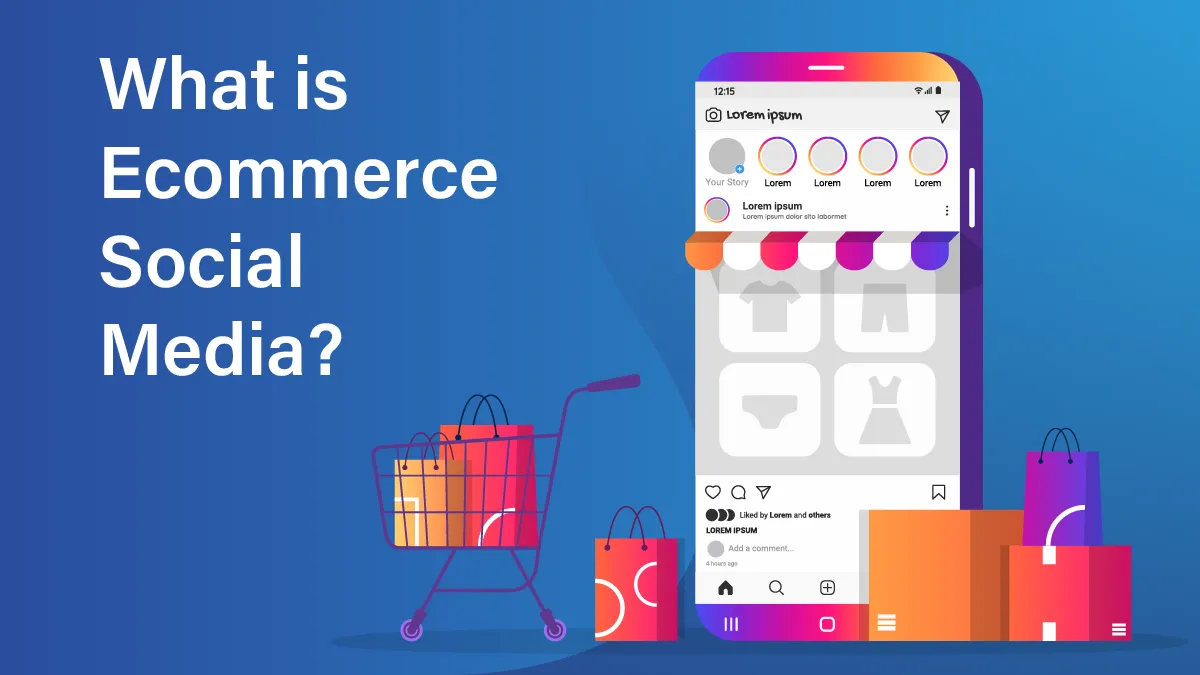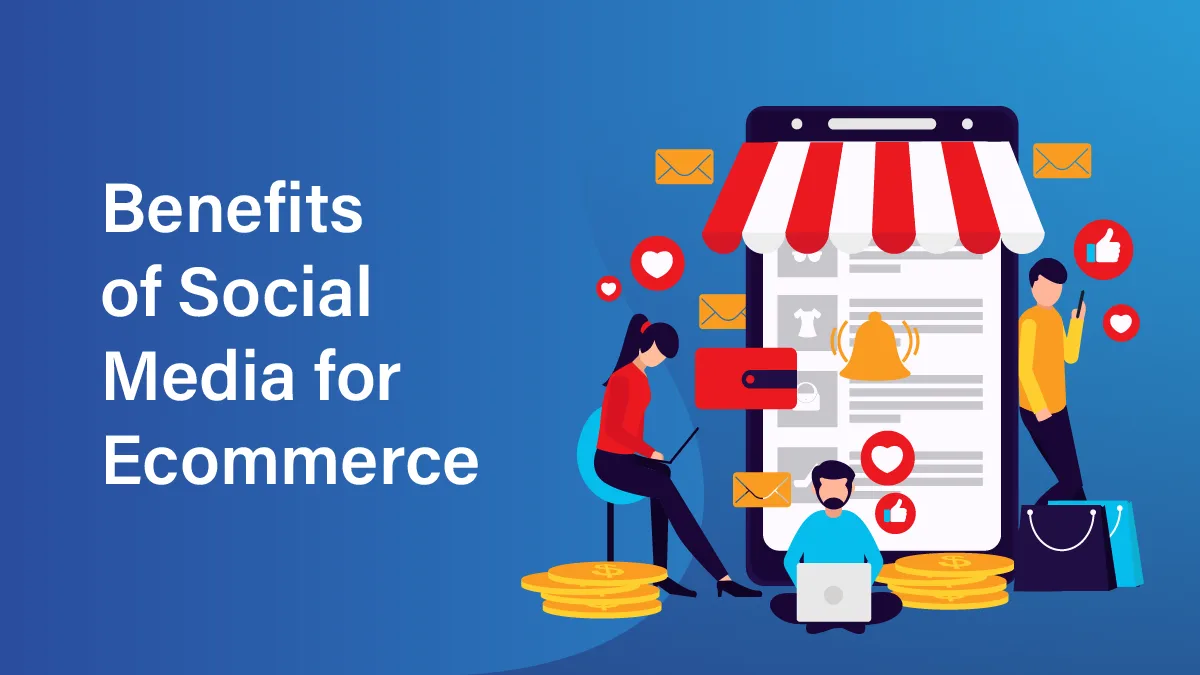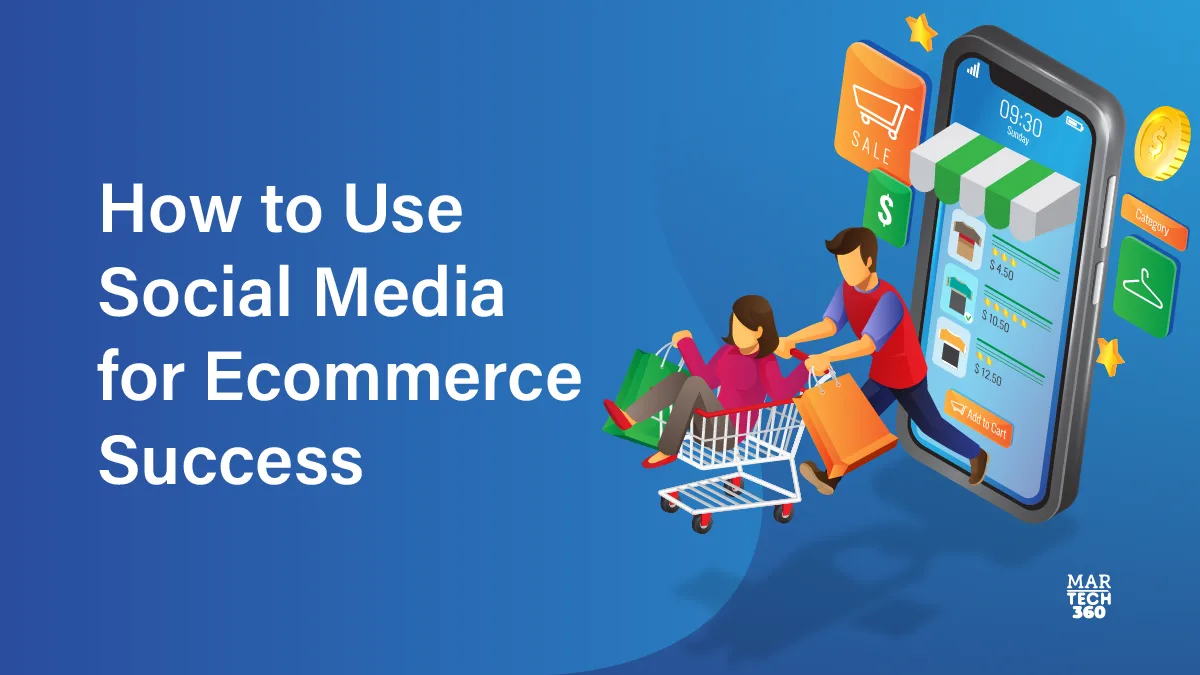There are over 3.81 billion social media users worldwide. They are on one or more social networking sites. Because of this, social media is one of the best ways to promote and market your goods and services. You will be able to reach a large number of potential customers with such a large user base, which will also help you increase your brand’s e-commerce conversion rate. This is why leveraging social media for ecommerce is creating a buzz.
Your primary objective as an e-commerce business is to sell your goods. However, how can you boost sales, retain customers, and outsell your rivals without going over your marketing budget? Using social media for e-commerce is a fantastic approach to achieve many of your business’s marketing objectives.
What is Ecommerce Social Media?

Marketing an e-commerce store through social media is known as e-commerce social media. E-commerce businesses can utilize social media to increase online sales, draw in followers, and raise brand awareness. Social media is another tool that businesses may utilize to promote their products, brand, and profile online.
Benefits of Social Media for Ecommerce

The following are the most frequently mentioned advantages of social media for ecommerce:
● Increase your online presence
Nearly any business may profit from marketing on social media sites like Facebook, Instagram, and Twitter, as 71% of individuals with Internet access use them. This is particularly true for online stores.
● Get in front of your target audience where they are most active
You may reach people while they are actively looking for particular products by optimizing your website for search engines and implementing PPC advertising. You can also reach users on their preferred online locations by using social media.
● Engage with your target audience
Another benefit of social media is that, in comparison to other advertising channels, the networks provide a far more informal means of interacting with potential customers. This makes it simple to have two-way discussions with people who are curious about your offerings.
● Encourage online sharing of your brand
Social media’s nature makes it possible for your existing consumers to recommend your business to their friends and family, which is perfect for any online merchant.
Also Read: Ecommerce Personalization: What Is It and Why Should You Care?
How can Social Media Help Boost Ecommerce Sales?
Utilizing social media for ecommerce leads to sales generation. This is how it helps boost sales:
Increasing brand awareness
Social media can boost brand recognition and assist create a positive brand image.
Fostering website traffic
Social media updates and interesting content can assist increase website visitors.
Increasing interaction with customers
Social media can facilitate the development of solid customer relationships by providing real-time communication, assistance, and feedback.
Providing information about consumer behavior
Businesses can improve their marketing efforts by using the useful data and analytics that social media platforms can offer.
Leveraging influencers
Influencers with a sizable internet following might work with brands to market their goods.
Using paid ads
Paid advertisements are one way for brands to reach a wider audience and drive traffic to their website.
Top 4 Social Media Ecommerce Platforms for 2025
Listed below are top platforms for businesses looking to use social media for ecommerce.
1. Instagram Shops
Instagram’s retail features have completely changed e-commerce. Shoppable posts and shopping tags allow businesses to easily transform their visual stories into shopping experiences. The Instagram shop gives users a specific area to browse, interact, and buy products. Instagram is therefore the ideal medium for
- Fashion brands
- Retailers
- Product-centric businesses
Instagram, which has more than 1 billion active users, is a great way to reach potential customers and increase revenue.
2. Facebook Marketplace
One of the most often used platforms for e-commerce companies is Facebook Marketplace. The platform offers a substantial edge with around 3 billion monthly active users. It enables companies and individuals to offer their goods and services for sale. Because it allows you to target prospective customers in your local community, it’s an excellent pick for entrepreneurs, smaller enterprises, and niche markets.
Since Facebook is currently the biggest social media network in the United States, your company ought to think about using it for your social commerce endeavors.
3. Pinterest for shopping
A popular visual discovery and bookmarking tool in the e-commerce industry is Pinterest. Businesses in the fashion, home décor, and lifestyle sectors especially benefit from it. Product Pins are available on the platform, allowing users to buy things straight from the pins they find. E-commerce firms can target visitors looking for inspirational and shoppable content with the use of Pinterest shopping advertising and catalogs, two effective techniques.
4. TikTok Shop
TikTok, a popular e-commerce platform, is well-known for its short-form videos. Its captivating video content is being used by brands to market their goods to younger people. Businesses can use TikTok’s shoppable features, such as branded hashtags and in-feed advertisements, to promote product discovery. TikTok’s expanding user base offers a chance to provide engaging content that appeals to consumers looking for visually attractive e-commerce experiences.
Social Media for Ecommerce Tips to Boost Sales
Here are seven fool-proof social media tips for ecommerce brands to increase revenue.
1. Optimize your social profiles
Optimize your e-commerce social media profiles with these tips:
- Engaging profile pictures: Use a clear, recognizable logo or professional image.
- Informative bio: Keep it concise, impactful, and include relevant keywords.
- Pinned posts: Highlight key content like promotions or brand introductions.
2. Leverage influencer marketing
Influencer marketing can boost e-commerce success if done right. Here’s how:
- Pick the right influencers: Partner with those whose audience matches your target market and check their content and engagement.
- Set clear terms: Define content type, posting schedule, and key messages in an agreement.
- Track results: Use tracking links or promo codes to measure campaign impact and gain insights.
3. Run targeted social media ads
Social media ads can effectively reach your ideal audience. Here’s how:
- Know your audience: Define personas based on demographics, interests, and behaviors.
- Tailor to platforms: Customize ads for each platform’s unique features.
- Track and tweak: Monitor performance and refine underperforming ads.
4. Create shoppable posts
Shoppable posts connect discovery to purchase. To boost social e-commerce:
- Showcase multiple products for easy browsing and buying.
- Use high-quality visuals to grab attention with stunning, high-resolution images.
- Include clear CTAs like “Shop Now” to drive conversions.
5. Gather user-generated content (UGC)
Harness UGC to boost trust and authenticity:
- Launch campaigns: Encourage users to create content about your products and share top picks on your profile.
- Engage: Respond to customers tagging your brand or sharing product-related content.
- Seek permissions: Always get approval before using UGC in ads.
6. Use hashtags strategically
Hashtags boost your post’s reach and connect it with the right audience. Here’s how to use hashtags in social media for ecommerce effectively:
- Research trends: Use trending and niche-specific hashtags to expand your audience.
- Create branded tags: Encourage customers to share experiences using your branded hashtags to build community and visibility.
- Use sparingly: Avoid overloading posts; stick to a few relevant hashtags for a cleaner, impactful look.
7. Analyze data and improve strategies
Optimize your e-commerce social media content by:
- Tracking Metrics: Regularly analyze engagement, CTR, conversion rates, and ROAS to identify and improve what works.
- A/B Testing: Test variations in content, visuals, and ad copy to determine what performs best.
- Following Trends: Stay updated on new social media features and trends to keep your strategy fresh.
Summing it Up
Adopting social media for ecommerce has become essential as companies battle with intense competition and ever-changing consumer behavior. Ecommerce social media marketing is an essential tool for driving growth and building brand awareness. By implementing effective social media strategies for online stores, you can create engaging content that resonates with your target audience. Whether it’s through well-crafted ecommerce social media campaigns or strategic ad placements, each effort contributes to boosting sales and customer loyalty. Always measure the social media ROI for ecommerce to ensure your efforts are delivering measurable results. With the right approach, social media for ecommerce can become a powerful asset in your business growth.


Comments are closed.